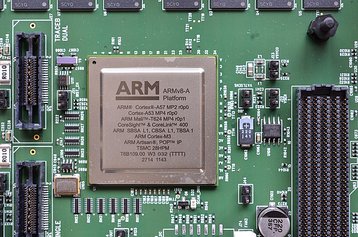Fresh off of the implosion of Nvidia's acquisition of Arm, the company has suggested it still has big plans for the GPU market.
Speaking on a media briefing attended by DCD, the company's new CEO Rene Haas said that it is looking at markets that "need an accelerator, that need something that can do offload from a CPU."
Haas was asked by The Next Platform's Timothy Prickett Morgan about whether the company would compete in the GPU space for high-performance compute and artificial intelligence workloads, referencing Nvidia's flagship A100 GPU and whether Arm would be interested in building a more open, licensable competitor.
"I've got Inder [Singh] with me who will keep me honest as a long term company CFO, and I'm day one on the job as a first time CEO, so I [need to] make sure I don't get too forward-reaching in term of my comments here," Haas replied.
"But your commentary is an interesting one, because today Mali is largely known for our footprint in mobile," he said, referencing the company's GPU IP for consumer devices like smartphones.
"It's the most popular GPU on the planet - Nvidia notwithstanding, most GPUs that ship in the world are actually the Mali architecture. I think as you start to get into the hyperscale, and you start to fast forward into the cloud, you get into some really interesting opportunities relative to the CPU, the GPU, where is the machine learning taking place? Is it a standalone NPU [neural processing unit]? Can you do something else relative to that area?
"I can tell you that we've got a lot of people looking at that, and I think it's one of the biggest opportunities for us."
Haas could have been talking about adding more machine learning compute to CPU designs, but followed up by mentioning offloading from CPUs to accelerators. He said: "It's also a playbook that's very relevant from cloud to hyperscale, into autonomous - that needs an accelerator, that needs something that can do offload from a CPU."
He continued: "So nothing I can tell you yet about product plans. I can tell you that we have a lot of smart people inside the company spending a lot of cycles thinking about different things we can do in that space."
The company has equally been wildly successful with mobile CPUs, along with other low-power devices, but has long struggled to break into the hyperscale server market. That has begun to change in recent years, however, most notably with Amazon Web Service's custom Graviton processor range.



